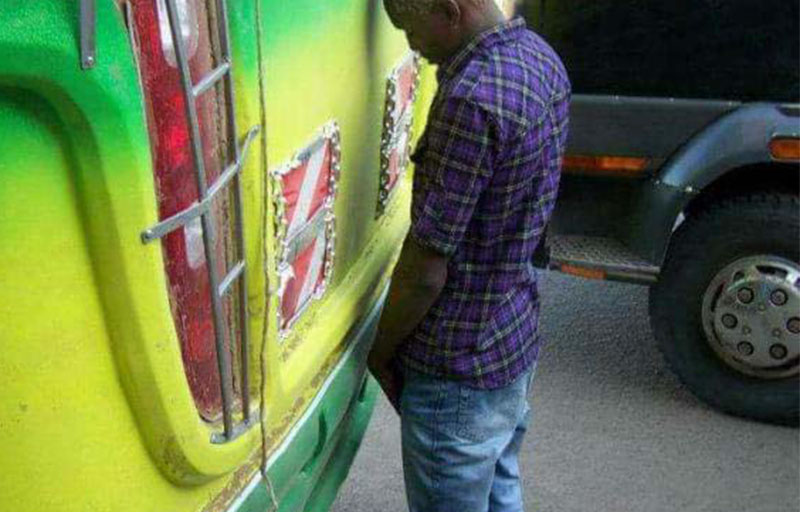
The Huruma, Dandora-Kariobangi roundabout on Outering Road, Nairobi, hosts an assortment of inorganic salts and organic compounds, including proteins, hormones, and a wide range of metabolites, varying by what is introduced into the body.
How and why? you ask. Simple. When pressed commuters cannot hold it anymore, bladders are emptied there, the alternative being to wet themselves in public.
The interchange, which has several bus stages for matatus heading to the CBD, Thika Road, Doonholm, Kariobangi, Huruma, and Dandora, has no single public toilet!
Jeniffer Omose, a retailer in this area says that she is used to seeing well-dressed men and women answer their calls of nature in full public view.
Moral decay?
“This behaviour is common here but I think this is moral decay. I just wonder what these men think of when they do this around women and children,” she remarks.
Benard Baraza, a conductor with Forward Sacco matatus confirms this menace saying: “Yes it is true, this behaviour is rampant but what do you expect us to do when there are no toilets here?”
When Stephen Ekirapa, an official with the Kenya Urban Roads Authority was called to explain why the roundabout had no toilet, he explained that the road was still under construction and such facilities will be put up in due course.
- Retired teacher finds new calling in empowering PWDs in Busia
- The Invisible Economy: Kenya's Care Policy to value women's unseen labour
- SHA: Patients' one-year pain, scandals and unpaid claims
- SHA whistleblower has not been fired, Authority says
Keep Reading
“This roundabout and the entire Outering Road are still under construction, we will liaise with the City Council to ensure that such facilities are put in place” he assured.
Enter Dr Owuor
Dr Stephen Owuor, a public health officer based at Mama Lucy Kibaki Hospital explains that there are health risks associated with urinating in public.
These include contracting tract infections which are normally transmitted by a bacterium in urine. The bacteria can spread and infect those who pee at the same place.
“I know many people are unaware of these but most of the tract infections that people suffer from have been contracted from the public urinary points including public toilets” explains Dr Owuor. The doctor also adds that the urea content in urine attracts cockroaches and bacteria.
According to him, these insects are careers of bacteria including those found in urine and can pass them over to water, food or drinks.
The law
The Kenya Public Health Act outlaws the act of urinating or defecating in any place open to public view. According to Clause 16 of the Public Health act;
A person who urinates or defecates in any place other than using a lavatory commits an offense and liable to fine not exceeding Sh1000 or imprisonment not exceeding six months of both. A “public place” means any place which is in the open by which the public or a section of the public has a right or virtue of access and or expression.
The act goes on to stipulate that public establishments including hotels, restaurants, supermarkets, banks, churches, among others must provide washrooms and sanitation programs to their clients.
In April this year, the government through the Ministry of health ordered all public establishments to provide sanitation services free of charge to their clients.
According to Kepha Ombacho, the Director of Public Health, public facilities such as hotels, parks, bus stations, supermarkets, pubs, and banks among others have to provide such services lest they risk being closed.
Ombacho also urged county governments to enforce the Public Health Act in full so as to avoid large costs associated with treating diseases associated with poor hygiene and sanitation.
 The Standard Group Plc is a multi-media organization with investments in media
platforms spanning newspaper print
operations, television, radio broadcasting, digital and online services. The
Standard Group is recognized as a
leading multi-media house in Kenya with a key influence in matters of national
and international interest.
The Standard Group Plc is a multi-media organization with investments in media
platforms spanning newspaper print
operations, television, radio broadcasting, digital and online services. The
Standard Group is recognized as a
leading multi-media house in Kenya with a key influence in matters of national
and international interest.











